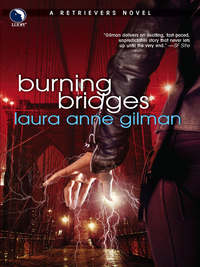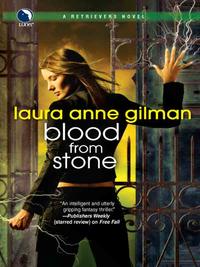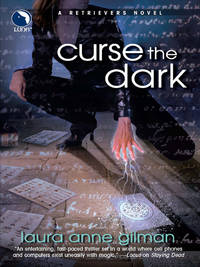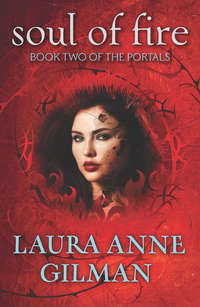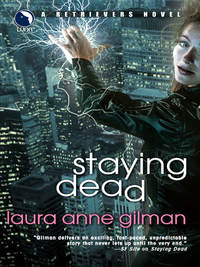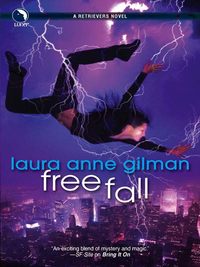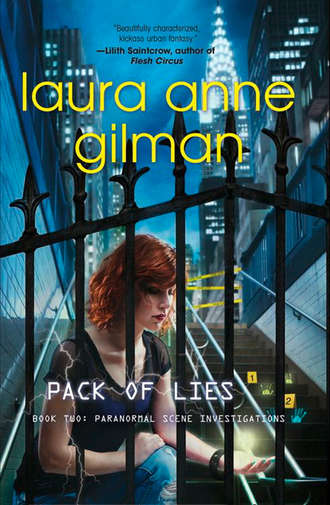
Полная версия
Pack of Lies
I leaned on the counter and stared at myself, taking inventory. Hair: still blond, still short, still almost-curly, like a palomino poodle. Eyes: a little bloodshot but nothing that couldn’t be attributed to a lack of sleep. Skin: pale, but that was normal for me. Were there new lines around my mouth and eyes that hadn’t been there last night? Probably. I was only twenty-two, but sometimes I felt like I was thirty, at least.
I loved my job. Ian had something else driving him, some figurative demon crowding his shoulder, but the rest of us … we just wanted to know why, who, what … and we liked to push ourselves. It wasn’t an obsession: I could walk away, if it got too much—and I knew I never would. This was my passion, what I was driven to do.
I practiced a smile, something cheery and bright to reassure everyone I was fine, and shuddered at the result. Maybe not just yet.
I loved my job, but some days the fun level … wasn’t.
Face splashed and mouth rinsed out, I wandered down the hallway and found Venec, as expected, in the room I’d left. The door was open, so I just stuck my head in enough to see him sitting at the table, back straight, elbows on the chair-arms, watching the display the way a meter maid watches a parking meter ticking down the last seconds.
I didn’t say anything: He knew I was there.
One hand lifted, and the display stopped just as the ki-rin dropped behind his companion, a scarce minute before the attack. “The others are back?”
“Yeah.”
“All right. Tell them to start writing up their reports, and I’ll be with them in a minute.”
I nodded, even though he wasn’t looking at me. “Should they come here?”
“No.” He stared at the frozen display. “No, I want them to come to the discussion with a blank slate. Time enough for them to watch this when we’ve looked at the rest of the picture.”
In other words, nobody else needed to get their facts tangled by an emotional reaction. It made sense. Part of me was relieved that the girl wouldn’t have her trauma spread around, and part of me was pissed that I got stuck with it … but Venec had gone there, too. I wasn’t alone.
It didn’t help as much as I’d hoped.
“And Torres?” His voice was quiet, a softer growl than usual.
I paused, but didn’t look back. “Yeah, boss?”
“You did good.”
That didn’t help, either.
I walked down the hallway, feeling the walls press in around me. The others were still gathered in the break area. Sharon was writing up her notes already, slice of pizza in one hand, pen in the other, frowning intently, while the guys were bullshitting about baseball. Still no sign of Stosser. I leaned against the wall and watched them. Although my stomach gave another slow, queasy roll from the smell and sight of the pizza, I didn’t feel the urge to throw up again. I didn’t feel much of anything, in fact, the earlier unease drained from my body while I talked to Venec. While I was normally pretty calm—that was part of why I was so good at this job—that sudden loss of emotion didn’t feel right. It was as though someone had siphoned the emotion out of me, and I knew enough psychology to know that probably wasn’t a good thing.
I needed to get out of here, put some distance between myself and the display room, so when it all came slamming back, I could break in private.
I went to the closet, and pulled out my coat. They already had my report. If Venec or Stosser wanted me, they knew how to get in touch.
“Hey, where you going?” Nifty asked, wadding up his napkins and tossing them into the trash.
“Home,” I said.
My apartment isn’t much, by my mentor’s standards, but it’s better than what I’d been born into, and more importantly right then, it’s all mine. My refuge. A cash payoff to the landlord, and I’d painted the walls of the main room a pale purple, and the kitchen dark gold. The furniture was a clash of expensive antiques and trash-day rescues that looked pretty damn fine, if I did say so myself.
I kicked my shoes off and dumped my coat and bag on the floor. There was a pitcher of sweet tea in the fridge, and I drank it straight, like I’d spent the past week being dehydrated in the Sahara, then grabbed an apple and went back into the main room. Most people who had studio apartments separated out their living and sleeping space—not me. My bed was on a loft platform in one corner, but my dining table was shoved underneath, and got pulled out whenever someone came over for dinner or stayed for breakfast. There were two love seats, reupholstered in gold velvet a shade lighter than the kitchen walls, and a black lacquered Chinese chest that held all my dishes and silverware. I’d had a coffee table at one point, but the glass chipped during a party when I first moved in, and I hadn’t had time to find a replacement. Something sturdier this time …
Although … another party like the last one would get me kicked out of the building, payoff to the landlord or no. I’d been in such a rush to take the apartment before someone else could steal it from me, I hadn’t thought to ask about the neighbors. They weren’t bad, just mostly older and settled, and not really happy with parties, even quiet ones, that went on all night. Not that there had been all that many. Since moving to the city last summer, I’d tried to build up a network of friends, people who liked to go clubbing, to party not heavily but well, but the past few months the job had overrun all of that. If I hung out at all, it was mostly with the team, and when I did go out, it was weird … sometimes now even in the middle of a hot dance floor I’d feel this sudden urge to be home—alone.
I took a bite out of the apple, absently, and stared at the wall opposite me. Where most people would have a flat-screen television, I’d hung a mosaic made out of hundreds of colored glass tiles. The sunlight from the windows hit it just-so twice a day, and rainbows streamed all over the place. Magic. Right now, it was still, just bits of colored glass doing nothing special at all, except reflecting my image back to me, fractured and broken.
The apple tasted sour in my mouth, and my beloved, comfortable space suddenly felt shabby and sad. I spit the apple into my hand, tossed the entire thing into the garbage can, and without a ping of warning—or asking permission—I Translocated my sorry ass to J’s place.
When a teenager starts showing signs of magical ability, they’re assigned a mentor, someone who will take them through the stages, teach them what they need to know and help them figure out their strengths and weaknesses. Sometimes it’s a parent or cousin, but more often it’s someone not related, a friend of the family with a skill level close to yours, or a particularly good rapport with kids.
Ideally everyone mentors, at some point, but the reality is that not everyone’s good at it. And it’s important to be good at it—you’ve got another person’s life depending on your ability to teach them properly. We’re taught one-on-one, not in classrooms, and the mentor-student relationship trumps almost every other bond we have, even after the mentorship ends.
In my case, Joseph Cetala was more than a mentor—he’d been standing in loco parentis since I was eleven. Long story-short version was I went from being the only child of a ne’er-do-well lonejack carpenter to the live-in student of a Boston lawyer/Council muckety-muck with contacts in the White House … and maybe even the Kremlin, for all I knew. By the time I came along he’d retired from all that, and just did some very quiet and occasional consulting of the sort you don’t talk about. J hadn’t been real happy with my going to work for Stosser and Venec—he wanted me somewhere safer, like a paralegal for a cushy law firm, or teaching in an inner-city school—but he was experienced enough and honest enough to admit that PUPI was needed, and that I was good at what I did.
That didn’t mean he didn’t worry. I might not tell him the shit that went down when we were on a case, but I wasn’t stupid enough to think that he didn’t hear about it, eventually. We’d reached a compromise. There was a lurking fatae with the inappropriate name of Bobo who occasionally showed up late at night to walk me home when things got rough—or Bobo thought they might get rough—that soothed J’s discomfort, and we never talked about the dangers of my job.
Translocation only takes a few seconds, but it’s a major power drain for most of us, messing with natural physics in ways that supported the whole “indistinguishable from magic” thing Zaki—my dad—used to quote. Nifty, who was our best practical theorist, had tried more than once to explain it, but all I cared about tonight was that it took me home.
“Bonita.” J was in his early 70s, with fine patrician features and a shock of immaculately groomed white hair, and you’d think he’d greet you in the library of his ten-room apartment wearing a tuxedo and carrying a brandy snifter. Reality wore a pair of ratty jeans and a Harvard sweatshirt, and carried a bottle of Stella. He didn’t look at all surprised to see me. He never did. “Would you like a beer?”
I would.
I dumped my shoes on the outrageously expensive carpet, curled up in the security of a leather club chair, and cradled my bottle in both hands, letting the condensation soak into my skin. The antiques in my apartment all came from J’s collection, but he’d never had a hands-off attitude; to him, furniture was what you sat on, and a sofa was for naps as well as tête-à-tête. I knew better than to put my bottle down without a coaster, though.
We did the quiet chitchat for a while; he’d been down to NYC to take me out to dinner just last week, so there really wasn’t much new to share, unless I wanted to talk about the non-thing that kept showing up between me and Venec, which I didn’t, or the cold empty echoing thing where my emotions should be, which I really didn’t.
“Hey,” I said suddenly, realizing that something was missing. “Where’s Rupert?” Rupert was J’s dog, an aged sheepdog who had as much to do with raising me as J did.
“Vet. His stomach decided to disagree with him. I’m having them do a full checkup, just in case. He’ll be home tomorrow morning, don’t worry.”
Rupe was almost fifteen. Anything that required an overnight stay at the vet worried me. And I knew it was worrying J, but if he didn’t want to talk about it, we weren’t going to talk about it. Time to change the subject. I thought about regaling him with the story of Jennie’s party last night, or the way the hot doctor across the way from my apartment threw her most recent lover out wearing only his boxers and one sock—but finally had to accept the fact that I hadn’t come here for distraction, but after-the-fact mentoring.
“We have a new job.” He’d heard already; I knew he’d heard from the way his expression didn’t change at all. J was a damned good listener, though; he just sat back and let me talk, or not, as I wanted.
I didn’t want. It came out anyway.
“Girl, a Talent, barely out of mentorship, probably. Companion to a ki-rin.” J was one of the most traveled, most experienced Talent I’d ever met. He knew how rare they are, here and in their native country. It’s not like griffons, breeding two kits at a time, or the damned piskies, who populate like squirrels. Ki-rin are magical, even to us. If the perps had hurt it … I shuddered at the thought. If the ki-rin had been hurt, those rubberneckers would have been an angry mob of fatae, not human looky-loos. “They were out for a night clubbing, or she was, and he’s keeping her company. Two guys, Talent, jump them on the way home. Jump her. The ki-rin had fallen behind a little. It was late, his mane is pure white so he isn’t a youngster anymore, I guess.” I paused, suddenly struck by the thought. “How old do ki-rin get, anyway?”
J hadn’t moved while all this was pouring out of me, sitting in his usual armchair, legs crossed at the ankle. “I don’t know. It’s considered quite rude to ask.”
“Huh. Well, it … didn’t get to her in time. Killed the first attacker, wounded the second, I guess it didn’t kill him because he didn’t get the chance to do anything?” My hands were colder than the bottle I was holding. “The story seems straightforward, you know? Bad guys do bad thing, are killed—or maimed—by the good guy, survivor gets jail time. We’ve been asked to investigate only to make sure everything’s clean, that it was self-defense, I guess. Stosser didn’t say outright, but the only one who’d hire us for something like this, where there’s no money involved, or a revenge motive, would either be family or Council, and I got the feeling it wasn’t family. Don’t know why Council would be taking such a hard-line interest, though.”
Council was for Council members, which meant human, not fatae; even if a ki-rin was involved, their instinct would be to sweep it under the rug as fast as possible to protect their people. Had the dead guy been Council? It wasn’t impossible—Council was the country club association of Talent, and there were as many ass-wipes in country clubs as there were hanging on street corners. But then they’d be trying to cast blame away from their man, not hire us to find out the actual facts.
No, something didn’t feel right. I wondered what Venec thought of this case, and in that thought I could almost feel his hand on mine again, the smooth, firm touch sending another round of current-shock through my system, then flowing back out again, leaving me with a hitch in my breath.
“PR concerns, I suspect,” J said. “There has been some … unpleasantness toward the fatae recently.” He shifted, leaning forward from the hips. It was a tell he had, a giveaway sign when he was thinking hard about something. “In New York, and in Philly. Nothing here in Boston that I’ve heard. Minor annoyances, mostly, although some have become physical. Bigotry picking up a stick. I can imagine that the Council is concerned that this incident of yours not spark a greater conflagration. As it might, with a ki-rin involved.”
I forced myself to focus on his words, not the echo of tingling on my skin. “Yeah. I can see why they’d want this handled without a hint of impropriety on their part.” And that would explain the crowd that had gathered—they weren’t there for the ki-rin, not to support or gawk at it, anyway. And the Council boys had been there to protect it, not confine it. “Nice to know the Council thinks we can be of some use, even if it’s only to use us.”
All right, so I was bitter. The Council was split into regional areas, and half of them had refused to authorize their members to hire us … but the leadership was willing to use us when it suited their needs, to protect their privileged asses.
“Bonita …” J’s tone of voice was the same he’d used when I was missing the point during a lesson.
“Yeah, I know. It’s going to take time to win them over. I know.” My stomach wasn’t queasy anymore, and my skin didn’t tingle, but now my entire body was so very cold, so cold I couldn’t even shiver. It didn’t feel like shock or trauma, though—I knew those. It wasn’t even the emptiness of waiting to break, from before. It felt more like … like something had been cut out of me, where the outrage and fear should have been.
Weird. Very weird, discomforting, and I did not like. But if I said anything at all about it, J would freak.
I took a hit off my beer, and tried to wash the feeling away. “Well, we’re on the job now, and first look says this probably won’t take more than a day or two to wrap up and write a report. Yay us. What do you think will happen to the ki-rin?”
“For killing his companion’s attacker? A slap on the hooves, maybe. He would be within rights to demand reparation from the dead man’s kin, on the girl’s behalf. Every Council from here to Beijing would back him on that, if he did, and lonejacks …” He made a palms-up gesture. “Well, who knows how lonejacks will react to anything.”
I shook my head, rolling my beer bottle back and forth between my hands. I love J, but he’s a bigot in his own liberal way. Council and lonejack and fatae: the carefully delineated, political world that J lived in. I’d never had to worry about any of this before I became a Pup.
“And the girl?” I asked him, instead. “What rights does she have in all this?”
“She can take the survivor to court, if she …” J’s voice trailed off.
The bitterness surged to the fore again, and I grabbed onto it; anything other than that cold empty feeling. “Yeah. Take him to court, and not only does she have to relive the attack, but she has to explain what happened to the other guy, the one who actually attacked her. Oh, my oversize, horned intelligent magical companion killed him. With his horn. Yeah, a single slender horn, right in the middle of his forehead …”
I hiccupped, and took a long pull of the beer to cover the crack in my voice. “J?”
“Yes, Bonita?”
“Why?”
He didn’t pretend not to know what I was asking; he’d known me too long. “I don’t know, Bonita.” J had been a great mentor; still was, in a lot of ways. He’d always been straight with me, never lied, not even when I almost wished he would. “There are theories, and psychological jingo, but I’ve never understood how it translates into the human mind, thank god. I’ve just always been thankful that you grew up without encountering that sort of male, firsthand.” His voice was quiet, but I could hear the sorrow in it, for that girl, for me, for every girl who had something beautiful and joyful and honest taken from them for nothing more than selfish cruelty.
The cold forming under my skin cracked a little under the touch of his voice, and the itchy heat in my eyes promised a buildup of tears, but they didn’t come. We just sat there, and breathed in the quiet security of the library, of civilized behavior, until the daylight faded, leaving us in the shadows.
J reached out and turned on a lamp, bringing an amber glow into the room. “You’ll stay for dinner.”
It wasn’t a question, but I nodded anyway. “Please.”
A few hundred miles south in Manhattan, the same dusk was settling over the skyscrapers and brownstones, the sunset reflecting off the water and flashing last spears of light against the glass walls and windows of the financial district. Uptown, traffic was at rush-hour peak, but in the halls outside the PUPI offices, it was quiet. The seven-story building housed a dentist, a handful of CPAs, two lawyers, and a few offices whose signs didn’t give away their contents or purpose. On the bottom floor, there was a photographer who was rarely there, and a literary agency. Neither office had many visitors outside of UPS and FedEx deliveries, although those seemed to come every day.
By contrast, the office across the hall had a steady stream of people going in and out, the same seven people, usually in a group and often, as now, in the middle of a seemingly continuous conversation.
“We could …”
“No.”
“But …”
“No.” Venec’s growl warned the speaker not to push further. He had been itchy all day, morose and snappish, as though someone had shoved unbalanced current into his core, and he was in no mood to deal with the carping of overtired puppies.
There was a moving tangle of arms being thrust into coat sleeves and bags and backpacks being swung carelessly, and then they exited the office, Venec closing and locking the office door behind them.
“I don’t see why you don’t let us,” Nifty said, his voice calm and reasonable in a way that set Venec’s teeth on edge. “It’s not like—”
He cut the overeager PUPI off midsentence. “Because I said no and how many times will it take for me to say that until at least one of you listens?”
“Seven.” Sharon was positive.
“Four,” Nifty contradicted her.
“Eleven?” That was Nick, looking thoughtful.
Venec shook his head, feeling the exasperation simmer just under his skin. He really should know better by now, he really should. He’d scouted each of them, chosen them, trained them. The talkback came with the other traits he’d selected them for, no way around it. Mouthy and Talented, the pack of them.
On that thought, he paused and looked around for Pietr, who was the only one who hadn’t ventured a guess. “Where the hell is Pietr? Did we leave him in the bathroom or something?”
“I’m here.”
Sharon jumped, as the voice seemed to come from just at her left shoulder.
“I swear, I’m going to bell you,” she muttered. “Can’t you cough on a regular basis, or something?”
“I would, but you wouldn’t hear me.”
Venec frowned, listening in, this time intentionally. That had to be getting to be a sore point—Pietr swore he didn’t intentionally disappear when he got stressed, it just happened. God knew, there was enough stress in the office right now, after the day they’d had.
The usual reaction to having a stressful problem was to chew at it until it was solved. That was good, if they were on a hot trail. But they didn’t have enough information yet to solve it, so they’d start chewing on each other, instead. Part of his job was to prevent that. Bonnie’s need to get the hell out had been one he supported, even though he wished she’d said something to him beforehand. Now he needed to get the rest of them to go home as well, before he had to put a boot under their tails.
“Children, enough.” He put extra exasperation into his tone, not difficult to do right then. “Everyone go home. Or go to a bar, or a strip club or whatever it is that you do to blow off steam. You just can’t stay here.”
That was the rule he had invoked to get them to leave: nobody stayed late, not when neither of the Big Dogs—and yes, he knew what the team called them—were around. He had made that rule after their first investigation. His partner believed that, with his sister scolded and publicly shamed for her part in the death of the Null boy, her posse of anti-PUPI protesters wouldn’t do anything more against them. Ben was less certain of that, and not willing to trust any of his team on that chance. Besides, it gave him a good excuse to make sure they got a decent night’s sleep. His pups thought they were tough and tougher, and they were, but it wasn’t a much-older couple this time, or disembodied bits packed neatly in a cooler. It was a young girl, their own age. He might only be ten years older, but he had seen more than all of them put together. The case was shaking them, even if they didn’t realize it. Better they take a step away now, get a breath, do something normal.
“We go to Bonnie’s,” Nick said in response. “But she’s not home. I called and got her answering service, and she’s not responding to a ping.”
“Oh, god, she’s not still dating what’s-his-name, is she?” Nifty asked, distracted. “The doink with the goofy smile?”
Nick threw up his hands in a dramatic gesture of disgust. “What, you think she tells me everything?”
“Yeah.” Sharon, Pietr and Nifty all responded in the same instant. Venec just closed the door quietly behind him while they were all preoccupied. He had no interest in their personal lives beyond how it affected their professional behavior, not even their sharp young technician, had no interest in her at all beyond her skills in the office.
“Right. No, she’s not,” Nick said. “I think we scared him off.”
“We did no such thing.”
“Of course we did,” Sharon said. “He took one look at us and ran for the hills. No great loss, he wasn’t right for her anyway. Too …”
“Stable? Sturdy? Much a productive member of society?” Nifty asked.
“Boring. Bonnie should not be with someone boring.”
“Right.” Nick rolled his eyes, still being dramatic. “And we’re all having such good luck on the dating front, we can give her advice.”
It seemed that nobody wanted to touch that comment, from the brief silence that fell.
“So if she’s not home where are we going to go?” Nifty asked.
“We might try our own homes?” Sharon suggested caustically. “Since Big Bad Dad here won’t let us work any longer, ‘cause he’s got a hot date or something….”
There was a flyer stuck to the nameplate on the door. Annoyed, Venec plucked it off, telling himself that his annoyance had to do with the solicitation, and not the way Bonnie’s love life was being batted around. Too young, too much an employee. Too much trouble, damn it.


